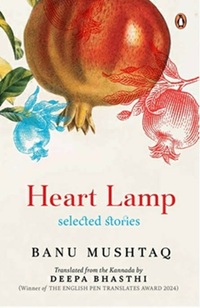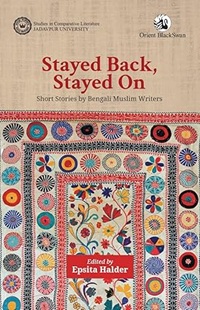-
পরবাস
বাংলা ভাষা, সাহিত্য ও সংস্কৃতি
Parabaas, a Bengali webzine since 1997 ... ISSN 1563-8685 -
ছোটদের পরবাস
Satyajit Ray
Rabindranath Tagore
Buddhadeva Bose
Jibanananda Das
Shakti Chattopadhyay
সাক্ষাৎকার -
English
Written in English
Book Reviews
Memoirs
Essays
Translated into English
Stories
Poems
Essays
Memoirs
Novels
Plays

The Land Where
I Found It All-

পুত্রবধূর চোখে গৌরী আইয়ুব এবং প্রসঙ্গত
-

বিশ্বের ইতিহাসে হুগলি নদী
-

বেদখল ও অন্যান্য গল্প
-

Audiobook
Looking For An Address
Nabaneeta Dev Sen
Available on Amazon, Spotify, Google Play, Apple Books and other platforms.
-

পরবাস গল্প সংকলন-
নির্বাচন ও সম্পাদনা:
সিদ্ধার্থ মুখোপাধ্যায়)
-

Parabaas : পরবাস : বাংলা ভাষা, সাহিত্য ও সংস্কৃতি -
পরবাস | English | Book-Review
Share -
Two books in translation-- Heart Lamp by Banu Mushtaq, and Stayed Back, Stayed On, edited by Epsita Halder : Nandini Gupta
 Heart Lamp: Selected Stories; by Banu Mushtaq; Translated from the Kannada by Deepa Bhasthi, published by And Other Stories, UK, 2024; ISBN: 9781916751163
Heart Lamp: Selected Stories; by Banu Mushtaq; Translated from the Kannada by Deepa Bhasthi, published by And Other Stories, UK, 2024; ISBN: 9781916751163Much has been written about Banu Mushtaq’s Heart Lamp, ever since it won the International Booker Prize this year. It is a collection of her stories, translated by Deepa Bhasthi. Banu Mushtaq's writings firmly belong to the Bandaya literary movement, that emerged in Kannada literature in the seventies as a protest against social and economic repression. Her women could easily have been Ashapurna Debi’s or Leela Majumdar's: regular women living everyday lives fighting against patriarchy, poverty, injustice, winning some, losing some.
The stories are haunting and familiar— a wife's desire to stop bearing children, a sister's demand for a share of the ancestral property, a poor woman's plea for justice—a mutawalli skilfully gets rid of such mundane inconveniences through deliberate and expedient rabble-rousing around the burial of a Muslim, though thieving, man. A common theme threads in and out of many of the stories: it is the children who weigh a woman down, and they who hold her up. For them, she clenches her teeth and suffers ignominy, for them she lives, finds food to fill her own 'dog's belly', throws away the matchstick even after dousing herself with kerosene. The collection gets its name from the partly autobiographical story of a woman who steps back from the brink and chooses to live for her daughter. Sometimes her stories are about men hankering for what they cannot have and never will through their women: Nayaz Khan forcing his wife into the most beautiful high heels, an Arabic teacher marrying for ‘gobi manchuri’. The book ends on a telling note with the story 'Be a woman once oh lord'.
 Stayed Back, Stayed On: Short Stories by Bengali Muslim Writers; edited by Epsita Halder; Translated by Various;, published by Orient BlackSwan, 2025; ISBN: 978-9354428708
Stayed Back, Stayed On: Short Stories by Bengali Muslim Writers; edited by Epsita Halder; Translated by Various;, published by Orient BlackSwan, 2025; ISBN: 978-9354428708In contrast, Stayed Back, Stayed On, edited by Epsita Halder, is an anthology of short stories by Bengali Muslim writers. At first, I am bemused; growing up with the fantastic story telling of Syed Mujtaba Ali or Syed Mustafa Siraj, I have never thought of them as ‘Muslim’ writers. But then, it is easy to overlook that Muslim lives have been inadequately represented in Bangla literature, a fact that both Tagore and Buddhadeva Bose had acknowledged. Hence this anthology. Among the many writers included are Abul Bashar, Sadique Hossain, Afsar Ahmed, to name a few, but only two women, Ayesha Khatun and Nadira Sultana. The stories in this collection range in time from the fifties to present-day Bengal; they may feature a ‘Muslimness’ or not, but all of them are stories of marginalised individuals grappling with patriarchy, religious orthodoxy and economic deprivation.
For the boatmen of the Sunderbans, jungle is the mother they tame through worship, and they are happy to claim their descent from murderers, robbers and criminals. Yet only at the end of month-long foray into the forest, foraging for timber, do they understand that “The bastard Mahajan is more beastly than the tiger of Sunderbans.” Harai brings back paddy from the Rarh to the darkness of a village where his wife waits lamp in hand, and a large clay pot of Padma water to wash the feet of the bullocks, Dhona and Mona. But the beloved bullocks are not coming back, for through his poverty and the religious duplicity of others, they are now halal meat—halal or haram? When Moju goes to court over her rightful share of property, lawyers from both sides keep serving up section after section of the Quran; without the money for this kind of justice, she leaves the courtroom, the town, gives up the Quran, and Namaz.
Some of the more contemporary stories are directly political, naming names, or sometimes veiling them only thinly. Other authors weave beauty and magic into the stories. Layli, traveling back home on the Lalgola passenger train, looks out of the window into the pouring rain, and sees her grandfather racing along on a shiny new coach, his horses’ nostrils flaring with luminescent smoke and a beautiful young woman seated beside him. As the unhappy Rashida Bewa waits for Azrail to arrive in the night, she takes off her widow’s garb and drapes the ancient green sari, heavy with zari, that she had worn at her wedding; then in the paper box left her by Loha Master, she finds a mobile phone and clasping it to her bosom, tastes an unending happiness. Noorbaksh paints walls that shine like mirrors. As he carries his child home, both drunk on the rice they receive for his work, he watches his child escape his grasp and walk ahead, while a thousand butterflies flutter over him, and the air fills with the heady smell of ripe mango ginger.
While Banu Mushtaq is not the first Indian to win the International Booker, Deepa Bhasthi is indeed the first Indian translator to do so. She liberally sprinkles not only her translations, but also her afterwords with Kannada or dakhni words. When she writes of her gustaqi in attempting the book, or mentions how Kannada relies not only on words but on haava-bhaava, it is easy to see how much more these words convey than any corresponding English word would. It is a timely reminder that translations are also for Indian readers without access to the source language. Translations that retain the flavour of the original must make certain demands on the reader, and this Deepa Bhasthi does, very effectively, denouncing both italics and footnotes, entirely.
Epsita Halder takes a more balanced approach, adding footnotes liberally, but not overbearingly. An anthology spanning so many authors, years, and radically different styles, would have been incomprehensible without footnotes. There are many translators to this anthology: Arunava Sinha, Ipsita Chanda, Paramita Banerjee, to name a few. The translations though mostly competent, are uneven; some of them sometimes bordering on transcreations. A small grouse, given the extent and importance of the anthology Epsita has compiled.
- মন্তব্য জমা দিন / Make a comment
- মন্তব্য পড়ুন / Read comments
- কীভাবে লেখা পাঠাবেন তা জানতে এখানে ক্লিক করুন | "পরবাস"-এ প্রকাশিত রচনার দায়িত্ব সংশ্লিষ্ট রচনাকারের/রচনাকারদের। "পরবাস"-এ বেরোনো কোনো লেখার মধ্যে দিয়ে যে মত প্রকাশ করা হয়েছে তা লেখকের/লেখকদের নিজস্ব। তজ্জনিত কোন ক্ষয়ক্ষতির জন্য "পরবাস"-এর প্রকাশক ও সম্পাদকরা দায়ী নন। | Email: parabaas@parabaas.com | Sign up for Parabaas updates | © 1997-2025 Parabaas Inc. All rights reserved. | About Us